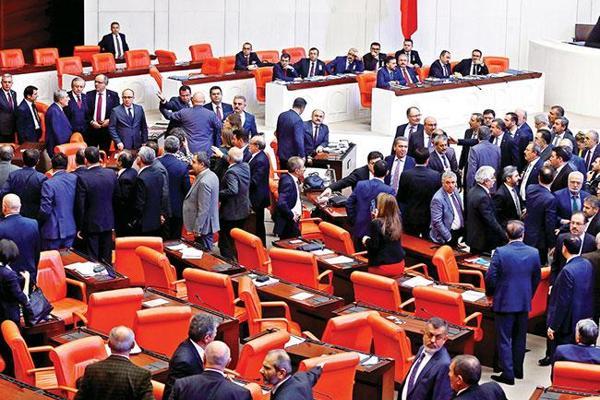Turkish Parliament passes controversial law on election alliances amid brawl
ANKARA


A major law giving the green light to political parties to form pre-election alliances and overhauling electoral regulations before the 2019 elections has been approved at parliament after a marathon night-long session, which included a physical fight between ruling and opposition lawmakers.
The 26-article law was approved by a majority vote led by the ruling Justice and Development Party (AKP) and the Nationalist Movement Party (MHP) in the early hours of March 13 without any changes, despite fierce criticism from the opposition over election security.
The AKP and the MHP agreed late on March 12 to let the General Assembly work until the whole package is approved, despite strong reactions from the main opposition Republican People’s Party (CHP) and the Peoples’ Democratic Party (HDP).
CHP Deputy Parliamentary Group Chair Özgür Özel told reporters at a press conference at 2.20 a.m. that “they were witnessing a shameful moment in the history of democracy.”
CHP lawmakers said the AKP announced its decision to work through the package late at night “in order to hide the package from the public.”
“This law paves the way for the state to cheat through the sticks of the state, to take control of all ballot boxes,” CHP deputy Levent Gök said during debates.
The package has passed without any amendments despite the fact that the CHP conveyed its report on the threat it posed to election security to AKP officials last week.
26-article package
With the package, political parties will be able to enter into elections as an alliance while keeping their political party emblem on ballot box papers. The parties in an alliance will be located next to each other on ballot papers and the name of the alliance will be written above their logos.
The 10 percent electoral threshold will still be in place but it will apply to the sum of the votes of the parties in the alliance. The number of lawmakers will also be determined according to the sum of the votes of the alliance.
Serious concerns have been raised over the fact that the law allows the relocation of ballot boxes for “security reasons,” while constituencies will be able to be “merged” by the authorities.
The regulation also changes the definition of “the area of a ballot box,” while paving the way for private security officers, armed personnel and municipal officials to enter ballot box stations to oversee voting. Citizens will be able to file complaints about ballot box officials and voting procedures, thus prompting the entrance of police forces into ballot stations.
Another contentious change that the law introduces is the fact that it allows unstamped ballot papers to be regarded valid. Previously all ballot papers had to be officially stamped to be deemed legitimate, and the High Election Board’s (YSK) unprecedented decision to deem unstamped papers valid during counting for the April 2017 constitutional referendum was harshly criticized by the opposition amid alleged voting irregularities.
Brawl at parliament
During debates on the law, CHP deputy Musa Çam recalled President Recep Tayyip Erdoğan’s earlier comments on MHP leader Devlet Bahçeli, causing outrage from the AKP and MHP seats.
“Erdoğan previously said about Bahçeli that ‘he doesn’t have any possessions and he doesn’t understand about having children,’” Çam said, referring to the fact that Bahçeli is unmarried and does not have children.
“You should not spit in a face that you will kiss one day. And you should not kiss a face that you have spat on before,” he added.
Following Çam’s comments, fisticuffs erupted after the MHP’s parliamentary group approached him at the rostrum. The session was adjourned but the brawl continued in the corridors outside.
